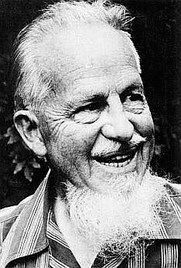
County map showing the Stout farm southeast of Wakarusa
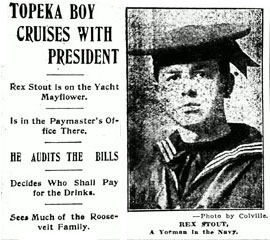
From the Topeka Daily
Capital, January 13, 1907
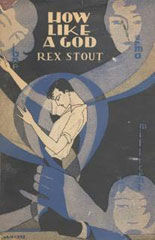
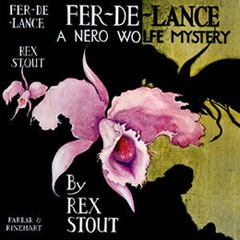
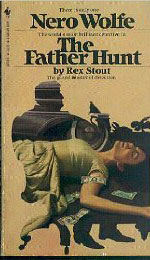

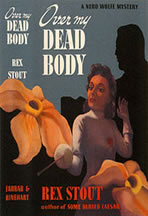

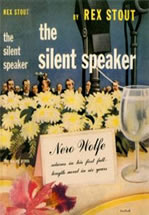
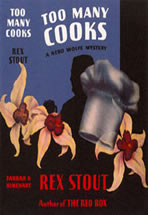

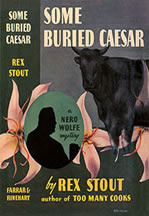

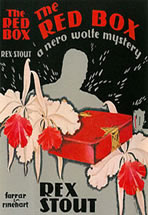

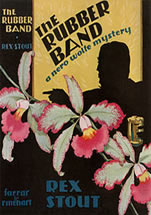
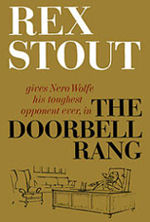
|
| Biography |
|
| |
Rex Todhunter Stout is considered by many to be the creator of one of the greatest fictional detectives of all time. The rotund, eccentric Nero Wolfe, along with his intrepid sidekick, Archie Goodwin, are two of the most enduring characters in literature. Stout was a prolific author: this popular series alone consists of 46 novels, 40 novellas, and numerous short stories. When Stout died October 27, 1975, he had 57 books in print, more than any living American writer at the time.
Rex, the sixth of nine children, was born in Noblesville, Indiana, December 1, 1886. Less than a year later his family moved back to Kansas (his sister Ruth was born in Girard, Kansas, in 1884.) Initially they stayed in Bellview, a district near the city of Topeka in the area now known as East Topeka. In 1889, his father bought a farm close to Wakarusa where Rex spent his early childhood doing chores, reading voraciously, and sharpening his debating skills to avoid his father’s punishments. John Stout’s Quaker background and sense of fairness led him to decide no child would be punished without having a chance to plead his case. Young Rex became a master of persuasion.
The elder Stout was named superintendent for all the schools in Shawnee County, so eventually the family moved back to Bellview and then to Topeka. Besides being precocious in his reading and spelling skills, Rex also proved to have a great talent for math and at the age of 13, three years younger than the other students, he entered Topeka High School. There, he was captain of the debate team and senior class poet. During this time, the family began putting on dramatic presentations for family and friends, some of which were written by Rex, some by Ruth. At age 17, Stout sold his first poem to The Smart Set. The magazine apparently never published it and Rex, disgusted with writing, burned everything he had written up to then. Before he left Topeka, he did have a brush with real life detective work when a Victor disk graphophone was stolen from him and then recovered. The police chief’s name was A. G. Goodwin.
After spending a very short time at the University of Kansas, he deduced he already knew more than most students there and decided to skip college. He visited several states and worked at a variety of jobs including usher, bookkeeper, hotel manager, salesman, bellhop, barker on a tour bus, and shrimper, before coming back to writing. In 1911, he again sold a poem to The Smart Set and this time it was published. After that he took another bookkeeping job and concentrated on writing short stories that sold quickly.
Stout decided that he wanted to do more serious writing and decided to stop until he made enough money to pursue it full-time. He married Faye Kennedy of Topeka in 1916. Shortly afterward he developed a school savings program, Educational Thrift Service, that made him financially independent by 1926. He traveled throughout Europe and then settled in Paris to write seriously. He wrote How Like a God, a psychological literary novel which received critical acclaim. His next four novels stayed in this vein.
Meanwhile his personal life was in turmoil. He lost his fortune in the stock market crash and he and Faye Kennedy divorced. He married Pola Weinbach Hoffman, a textile designer, and they quickly started a family. While his novels had received some good reviews, they didn’t make much money, so he turned back to writing salable fiction. He wrote the first Nero Wolfe novel, Fer-de-Lance, and it was instantly successful. He went on to write more than forty more Wolfe novels which spawned several movies, a TV series and The Nero Wolf Cookbook.
During his lifetime he was elected president of the Mystery Writers of America and received their prestigious Grand Master Award. For his book The Father Hunt Stout received a Silver Dagger Award from the Crime Writers Association and at Bouchercon 2000, the world’s largest mystery convention, the Nero Wolfe works were nominated Best Mystery Series of the Century and Rex Stout Best Mystery Writer of the Century.
Return to Top of Page |
|
|
Bibliography ( - housed in Thomas Fox Averill Kansas Studies Collection) - housed in Thomas Fox Averill Kansas Studies Collection) |
|
| |
Nero Wolfe Novels:
- The Nero Wolfe Cookbook (Amereon Ltd, 1987)
 Death Times Three (Bantam Books, 1985) Death Times Three (Bantam Books, 1985)- The Sound of Murder (Jove Publishing, 1979)
- A Family Affair (Viking, 1975 )
 Triple Zeck: A Nero Wolf Omnibus (Viking, 1974) Triple Zeck: A Nero Wolf Omnibus (Viking, 1974)- Please Pass the Guilt (Viking, 1973)
 Kings Full of Aces: A Nero Wolf Omnibus (Viking, 1969) Kings Full of Aces: A Nero Wolf Omnibus (Viking, 1969)- Death of a Dude (Viking, 1969)
- The Father Hunt (Viking, 1968)
- Death of a Doxy (Viking, 1966)
- The Doorbell Rang (Viking, 1965)
 Royal Flush: The Fourth Nero Wolfe Omnibus (Viking, 1965) Royal Flush: The Fourth Nero Wolfe Omnibus (Viking, 1965)- Trio For Blunt Instruments (Viking, 1964)
- A Right to Die (Viking, 1964)
- The Mother Hunt (Viking, 1963)
- Homicide Trinity (Viking, 1962)
- Gambit (Viking, 1962)
- The Final Deduction (Viking, 1961)
- Three at Wolf's Door (Viking, 1960)
- Too Many Clients (Viking, 1960)
- Plot it Yourself (Viking, 1959)
 All Aces (A Nero Wolfe Omnibus) Some Buried Caeser; Too Many Women & Trouble in Triplicate (Viking, 1958) All Aces (A Nero Wolfe Omnibus) Some Buried Caeser; Too Many Women & Trouble in Triplicate (Viking, 1958)- And Four To Go (Viking, 1958)
- Champagne for One (Viking, 1958)
- Three For The Chair (Viking, 1957)
- If Death Ever Slept (Viking, 1957)
- Three Witnesses (Viking, 1956)
- Might as Well be Dead (Viking, 1956)
- Before Midnight (Viking, 1955)
- Three Men Out (Viking, 1954)
- The Black Mountain (Viking, 1954)
- The Golden Spiders (Viking, 1953)
- Triple Jeopardy (Viking, 1952)
- Prisoner’s Base (Viking, 1952)
- Murder by the Book (Viking, 1951)
- Three Doors to Death (Viking, 1950)
- In the Best Families (Viking, 1950)
- The Second Confession (Viking, 1949)
- And Be a Villain (Viking, 1948)
- Too Many Women (Viking, 1947)
- The Silent Speaker (Viking, 1946)
- Over My Dead Body (Farrar & Rinehart, 1940)
- Where There’s a Will (Farrar & Rinehart, 1940)
- Some Buried Caesar (Farrar & Rinehart, 1939)
- Too Many Cooks (Farrar & Rinehart, 1938)
- The Red Box (Farrar & Rinehart, 1937)
- The Rubber Band (Farrar & Rinehart, 1936)
- The League of Frightened Men (Farrar & Rinehart, 1935)
 Fer-de-Lance (Farrar & Rinehart, 1934) Fer-de-Lance (Farrar & Rinehart, 1934)
Nero Wolfe novellas (date first published):
Other novels:
- Her Forbidden Knight (Carroll & Graf, 1997)
- A Prize for Princes (Carroll & Graf, 1994)
 Eat, Drink and Be Buried (Viking Adult, 1956) Eat, Drink and Be Buried (Viking Adult, 1956)- The Broken Vase (Farrar & Rinehart, 1941)
- Alphabet Hicks (Farrar & Rinehart, 1941)
- Bad for Business, in The Second Mystery Book (Farrar & Rinehart, 1940)
- The Mountain Cat Murders (Farrar & Rinehart, 1939)
- Double for Death (Farrar & Rinehart, 1939)
- Red Threads, in The Mystery Book (Farrar & Rinehart, 1939)
- Mr. Cinderella (Farrar & Rinehart, 1938)
- The Hand in the Glove (Farrar & Rinehart, 1937)
- O Careless Love (Farrar & Rinehart, 1935)
- The President Vanishes (Farrar & Rinehart, 1934)
- Forest Fire ( Farrar & Rinehart, 1933)
- Golden Remedy (Vanguard, 1931)
- Seed on the Wind (Vanguard, 1930)
- How Like a God (Vanguard, 1929)
Books about Rex Stout:
Return to Top of Page |
|
|
| Writing Samples |
|
| |
Excerpt from an article in a 1935 issue of The Saturday Evening Post, “Who’s who--and Why.”
My career began—and my tone rings with assurance—at Wakarusa, Kansas, on a summer Sunday noon in 1894, when I was eight years old. I was walking home from Sunday school, barefooted, with my shoes tied to my waistband, ankle-deep in dust, from the village church three miles from our farm. There was a shortcut, saving all of an eighth of a mile, across one of Whipple’s prairie pastures, fenced with barbed wire. I wriggled through the wire and took the short-cut as a matter of course, preoccupied apparently with theological problems, since I failed to notice that the pasture, which had been vacant for some weeks, was on that day inhabited by Whipple’s big black longhorn bull. I never saw him until after I heard him, and then only for one wild glance. He was coming at me like a whirlwind, like a thunderbolt from hell—my theology is still confused—and it was a good 200 yards to the nearest stretch of fence. I leaped and scooted. I was diminutive, but a flea can jump far and fast. I was tough and I wanted to live. The prairie wind was west, and the dust of the bull’s pursuit passed me; I could hear him at my tail; Mart Whipple had said his horns were three feet long … There was the fence! I hurled myself at the ground beneath the lowest barbed strand, caught somewhere, yanked loose and rolled into the sunflowers in the ditch alongside the road; safe, for the bull had put on the brakes before the fence. My shirt was torn, one shoe gone, and barbs had made bloody designs on my shoulder and back—but that was nothing.
Well, as I realized the other day, that’s what I would call the start of my true career, my outstanding achievement—and yours, and yours?—has been my fair success in circumventing the bulls which infest the pastures I would like to walk in.
Excerpt from Forest Fire, published in 1933. One of his serious novels with a Brokeback Mountain-type theme.
His mind would not work; his head hurt. There was nothing to give. He was Stan Durham, that was all, Stan Durham acting like a goddam fool, trying to get ideas in his head where they did not belong. Where was there anything in him to feed a friend on? What was there about him for a friend to know or care about: He was a man who knew how to work and make other men work; and not only was that all he knew, it was all he was. And all he cared to be. A man, like a horse, must be true to his breed whether he wants to or not. He had said to Harry, a man lives lonely, but that was not true of all men. Harry would never live lonely, he was not born for it. The laugh in his blue eyes, the life in his smooth skin, the way he put his hand on your arm or your knee, the free careless words that flowed from his tongue—all those were for others, for men and women, for friendships and close feelings. Only an hour ago, walking across the meadow toward the box-car where the train would stop, Stan had seen him cup his hand under Elsie’s elbow to steer her around a gopher hole, and had felt a sudden sharp constriction in his breast and an idiotic impulse to ask his wife if she had forgotten how to walk. But she had not invited the gesture; it had been Harry’s. He would put his hand that way on anyone; had, doubtless, on hundreds, girls, boys, men, women; would, on hundreds more. If he took a friend, if ever he reserved any look of his eyes or touch of his hands for just one, not to be shared, he was not likely to pick on Stan Durham for it. Stan Durham had nothing to offer…
Excerpt from Fer-de-Lance, published in 1934, the first Nero Wolfe novel.
I jumped at him, for I thought he was going to open the drawer, but he waved me back; he was merely getting ready to leave his chair. He said, “Get my red thorn walking stick. –Confound it, will you do as I say?”
I ran to the hall and got the stick from the stand and ran back. Wolfe was moving around the desk. He came clear around to the side opposite his chair, and reached over the tray and pulled it across to him, with the glass and bottles still on it.
“Now,” he said, “please do it this way. –No, first close the door to the hall.” I went and closed the door and returned. “Thank you. Grasp the stick by its other end. Reach across the desk and catch the tip of the handle on the lower edge of the drawer-front. Push, and the drawer will open. –Wait. Open it, if you can, quite slowly; and be ready to free the stick quickly should it occur to you to use it for any other purpose. Proceed.”
I proceeded. The tip of the handle’s curve caught nicely under the edge of the drawer, but on account of the angle I had to keep the drawer wouldn’t start. I tried to push so as to open the drawer gradually, but I had to push harder, and suddenly the drawer popped out half a foot and I nearly dropped the stick. I lifted up to get the stick loose, and yelled:
“Look out!”
Wolfe had got a beer bottle in each hand, by the neck, and he brought one of them crashing onto the desk but missed the thing that had come out of the drawer. It was coming fast and its head was nearly to the edge of the desk where we were while its tail was still in the drawer. I had got the stick loose and was pounding at its head but it kept slashing around and I couldn’t hit it, and the desk was covered with beer and the pieces of the broken bottle. I was ready to jump back and was grabbing Wolfe to pull him back with me when he came down with the second bottle right square on the ugly head and smashed it flat as a piece of tripe. The long brown body writhed all over the desk, but it was done for.
The second bottle had busted too, and we were splattered all over. Wolfe stepped back and pulled out his handkerchief and began to wipe his face. I held on to the stick.
“Nom de Dieu!”
It was Fritz, horrified.
Wolfe nodded. “Yes. Fritz, here’s a mess for you. I’m sorry. Get things.”
Return to Top of Page
|
|
|
Quotes |
|
| |
From Writers and Writing by Robert Van Gelder, 1946.
On serious writing…
I know of only three reasons why a man should write serious fiction. One, if you love words and want to put them together in a way that pleases you—that was my reason for writing four novels. The second reason: if you’re burning to tell other people what you think is wrong; that is if you’re the preacher type. Some of the best writers now are fundamentally preachers. Johnny Steinbeck, I think, is one. The third reason to write serious fiction is if you are a great writer. There are damn few great writers and I’m not one of them. While I could afford to, I played with words. When I could no longer afford that, I wrote for money.
On creating Nero Wolfe…
Wolfe was born; he wasn’t synthetic. I didn’t have to sit down and decide: What color will his eyes be? Well, they’ll be blue. How much will he weigh? How will he walk? What expressions will he use? He was born.
____________
Karl Menninger on Nero Wolfe
One thing I like about Nero Wolfe is that he never dives into the realm of psychiatry; all of his murderers seem to be quite "normal people" who are over-tempted by the circumstances of everyday life. Somebody steps on their toes, or threatens to get ahead of them and impulsively they act. He never pretends to believe that murderes are mostly sick.
Return to Top of Page
|
|
|
| Links |
|
| |
http://www.nerowolfe.org/htm/stout/
Return to Top of Page
|
|
|
Documenting Rex Stout |
| |
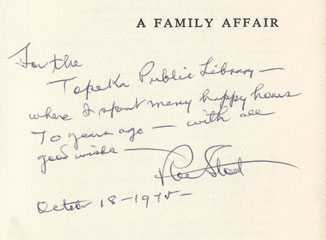
The Topeka & Shawnee County Public Library sent Rex a copy of A Family Affair to be signed for the Topeka Room collection. Shortly after, Mr. Stout passed away. Warren Taylor, former department head of the Topeka Room, said they didn't know what had happened to the book, whether he had signed it or not, and figured they might never see it again. A few months later, they received the book from Stout's heirs, signed nine days before his death.
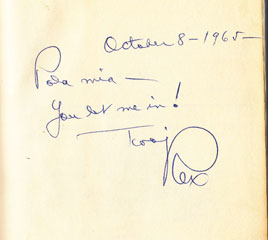
Also in the Topeka Room at the Topeka and Shawnee County Public Library is a copy of The Doorbell Rang with this inscription, apparently to Mrs. Rex Stout.

The approximate location of the Stout farm site south of Wakarusa as it looks in 2012.
Return to Top of Page
|
|


